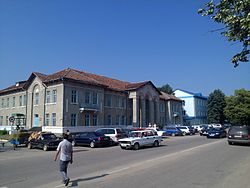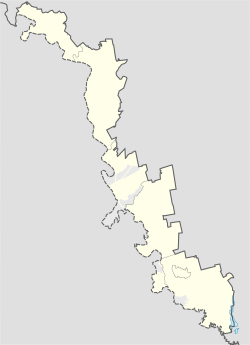Top Qs
Timeline
Chat
Perspective
Camenca
Place in Transnistria, Moldova From Wikipedia, the free encyclopedia
Remove ads
Camenca (Romanian: Camenca [ˈkameŋka], Moldovan Cyrillic: Каменка; Russian: Каменка, romanized: Kamenka; Ukrainian: Кам'янка, romanized: Kamyanka) is a town in Transnistria, a breakaway republic internationally recognized as part of Moldova. It is composed of the town itself and the village of Solnecinoe. Camenca is the seat of Camenca District. The town is located on the Dniester, in the north of Transnistria.
The mayor is Pyotr Mustya.[1]
Remove ads
History

The settlement was founded in 1609, when it was part of the Kingdom of Poland. In 1672 it fell to the Ottoman Empire, but was regained by Poland in 1699. Kamionka, as it was known in Polish, was a private village of the Lubomirski family, administratively located in the Bracław County in the Bracław Voivodeship in the Lesser Poland Province.[2] Following the Second Partition of Poland, in 1793, it was annexed by Russia.
The town became part of Soviet Ukraine in 1920, and then of the Moldavian Autonomous Oblast in 1924, which was soon converted into the Moldavian Autonomous Soviet Socialist Republic, and the Moldavian Soviet Socialist Republic in 1940 during World War II. From 1941 to 1944, it was administered by Romania.
Remove ads
Demographics
According to the 2004 Census in Transnistria, the town itself has 10,323 inhabitants, including 5,296 Moldovans (51.3%), 3,476 Ukrainians (33.67%), 1,305 Russians (12.64%), 61 Belarusians, 42 Poles, 35 Bulgarians, 32 Gagauzes, 23 Germans, 10 Armenians, 8 Jews, 3 Gypsies and 32 others.[3]
Remove ads
Climate
Notable people
- Nicolae Coval (1904–1970), Moldavian SSR politician, prime minister of the Moldavian SSR from 1945 to 1946
- Oleg Khorzhan (1976–2023), Transnistrian lawyer and politician
- Alexei Grabco (1936–2016), Soviet and Moldovan caricaturist
- Pyotr Vershigora (1905–1963), Soviet writer and one of the leaders of the Soviet partisan movement in Ukraine, Belarus and Poland
Gallery
- Dormition of the Theotokos Church
- Church
- Administrative building
- House of culture
- Police station
- Bus station
- Central market
- Camenca surroundings
See also
- Dniester Sanatorium, based in Camenca
Notes
- Transnistria's political status is disputed. It considers itself to be an independent state, but this is not recognised by any UN member state. The Moldovan government and the international community consider Transnistria a part of Moldova's territory.
References
External links
Wikiwand - on
Seamless Wikipedia browsing. On steroids.
Remove ads













